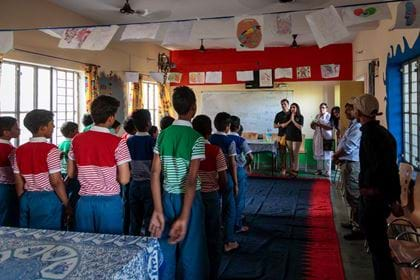Avnish and Anita Goyal visit anti-trafficking projects in India

Avnish and Anita Goyal, members of the British Asian Trust Founders Circle, visited our anti-trafficking projects in Jaipur, India. We caught up with them after their visit to hear about their visit and the experience they had.
What do you hope to achieve by supporting our Anti-trafficking Programme?
First and foremost is the vision of our foundation, to create a safer and happier world for children. The programme not only removes these children from the dangerous situations they are put in, but also nurtures them in a suitable environment where they have access to education. By working with this programme we are able to work towards our vision, and also hope to promote the great work being done so that other foundations and philanthropists may get involved as well. We believe in the value of every donation and area of support, as without the ripple you cannot create the wave.
How was your experience meeting the children at the projects?
In truth, it was quite sad. The trip exposed us to the trauma these children have suffered through abuse, but it was different to the abuse we are usually exposed to through our charity work as often it is centred around girls and sexual abuse. With this project however we saw how there was actually a demand for the products being made, which only served to further fuel the exploitation that the employers inflicted on the children. This made it worse in a way, as the industry is actually being fed by market demand, yet the end buyer is so unaware of the abuse that goes into making each product. Visiting the children truly deepened our understanding of the project and allowed us to develop a new connection – making us feel more committed to help end this abuse and engage others on the mission.
Did you hear any case study/story you’d like to share?
There was one instance we heard about, which is that when the boys fell asleep from exhaustion while working, the employer mixed chilli powder with water and threw it in their face. This irritates the skin and causes potential harm to the eyes as well as inflicting significant pain in the nose and throat. Some boys are also subjected to violence and sexual abuse
While we were visiting, the boys put on a play for us. They use drama as part of their therapy and it turned out to be a really powerful and emotional way of portraying the characters that they have encountered during their lives. By giving the children this opportunity of role playing, it gives them an outlet for their anger and frustration, while also promoting togetherness and the community spirit that is so important for their rehabilitation and recovery. This is promoted by Tabaar’s founder Mr Ramesh Paliwal, who is still motivated by his discovery of the street children as a voiceless community who need support so that they don’t end up being exploited in these industries – by rescuing the children and providing them with these creative outlets, he is giving them the voice that they didn’t have before.
Do you feel this work is helping give a better future to rescued victims?
This work is much needed and is making a huge difference in the lives of the children it rescues. The children are coming from very poor places originally, in many cases being sold by their families who are promised better future by the traffickers. It is these false promises that lead to so many families being ripped apart, and this has to stop. For us it highlights the desperation facing families in these poor communities that they would be quick to believe the traffickers false intentions.
What would your message be to other Founders Circle Members to encourage them to support our Anti-trafficking Programme more actively?
Our message would be this: find out as much as you can about a project, and then – if at all possible – take the time to go out and see it. Make sure you fully understand the project’s vision and approach by speaking to project workers and other supporters, then go and see the ground work for yourself.






